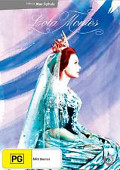
Directed by
Max Ophuls
110 minutes
Rated PG
Reviewed by
Bernard Hemingway


Lola Montes
In his final film, Max Ophuls reworks his 1950 hit, La Ronde, to good effect, at least artistically if not commercially. The central theme of an exploration of sexual desire remains but gone is that film's overly constrained metaphor of the merry-go-round, the series of overlapping episodes,and the world-weary and slightly fey tone, to be replaced with a darker view of a single individual’s life as depicted by a deluxe travelling carnival show.
Shot in CinemaScope and Technicolor and Ophuls’ only film in colour, it was marketed in its day as biopic of Eliza Rosanna Gilbert, a dancer who took the stage name Lola Montès, after separating from her husband in 1842 at the age of 21, slept her way to fame, infamously, with Franz Liszt and King Ludwig I of Bavaria, before falling on hard times.
If the subject matter was rather scandalous for its day, probably harder to take was Ophuls’ “post-modern” approach, telling his story via vignettes and flashbacks with a ringmaster (Peter Ustinov) narrating as Montès (Martine Carol) does little other than be observed by a gaping crowd. Indeed the film tanked on its release and the producers panicked, re-edited and shortened it with predictably disastrous results, effectively casting it into oblivion. The film was only restored to close to its original form in 2008 and we can now appreciate it in all its glory.
Whilst Ophuls’ taste for lavish staging is well to the fore and greatly benefits from the use of colour the director, known for his concern with the social identity of women, uses Lola’s story to present a portrait of Woman as Representation, the human being endlessly objectified by the machinery of mystification (Carol was criticised at the time for her static performance but surely this is the director's intention - to make her the Idea of Woman). One might also suggest the film as a prescient commentary on celebrity culture. Here the circus, with its connotation of tawdry spectacle is a much more rewarding metaphor than was the carousel in La Ronde, and in the final devastating scene Lola, once the femme fatale with the world at her feet is put in a cage for males “over the age of sixteen” to touch on payment of $1.
Filmed by veteran cinematographer Christian Matras, who also did La Ronde and Madame de... (1953) Ophuls’ characteristic fluid tracking and careful framing is much in evidence whilst Jean d'Eaubonne’s gorgeous production design provides a suitably meticulous realization of the director’s world view.
With its multi-layered complexity, Lola Montès is a cerebral rather than emotionally engaging film. For the latter see Marcel Carné’s Les Enfants Du Paradis (1945), a film whose influence is well evidenced here.
Want something different?





